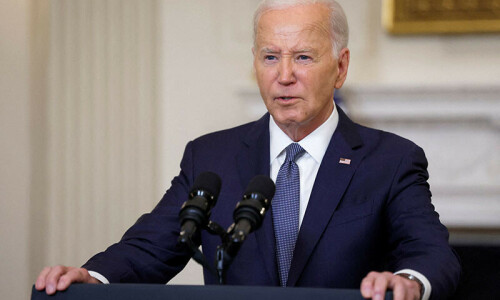GENEVA: A fact-finding mission mandated by the United Nations said on Monday the death of Mahsa Amini in the custody of Iran’s morality police was unlawful and caused by violence and that Iranian women still suffer systematic discrimination.
The death of 22-year-old Amini, a Kurdish Iranian woman, in September 2022 while in custody for allegedly flouting Iran’s Islamic dress code unleashed months of protests and the biggest challenge to the Islamic Republic’s clerical leaders in decades.
“Our investigation established that her death was unlawful and caused by physical violence in the custody of state authorities,” Sara Hossain, chairperson of the Independent International Fact-Finding Mission on Iran, told the UN Human Rights Council in Geneva.
The fact-finding mission found the protests that followed were marked by extra-judicial executions, arbitrary arrests, torture and ill-treatment, as well as rape and sexual violence.
“These acts were conducted in the context of a widespread and systematic attack against women and girls, and other persons expressing support for human rights,” Hossain said.
“Some of these serious violations of human rights thus rose to the level of crimes against humanity.”
In response, Kazem Gharib Abadi, secretary general of Iran’s High Council for Human Rights, accused the fact-finding mission of a “glaring lack of independence and impartiality”.
In separate comments to the Human Rights Council, Javaid Rehman, the UN Special Rapporteur on the human rights situation in Iran, said jailed human rights defender Narges Mohammadi “suffers from severe health issues, including serious heart and lung conditions, placing her health at great risk”.
“She was denied medical access because she did not have the mandatory hijab,” Hossain said about Mohammadi, who won the Nobel Peace Prize last year.
Hossain said that since the protests began in 2022, women and girls in Iran were confronted daily by discrimination “affecting virtually all aspects of their private and public lives”.
She said it was “hard to fathom” that women’s access to schools, universities, hospitals and courts as well as employment opportunities “should be subjected to a wholly arbitrary requirement of wearing the mandatory hijab”.
Published in Dawn, March 19th, 2024












































Dear visitor, the comments section is undergoing an overhaul and will return soon.